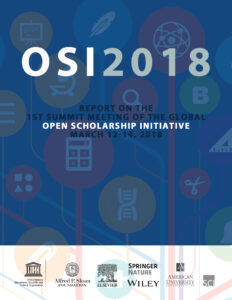When the roadmap for OSI was first being developed in 2015, our original intent was to hold a series of 10 annual meetings beginning in 2016. After the first two meetings, however, it became apparent that the next step in this process should be to pause and have just the summit group meet to formally discuss and plan what comes next. This decision was also necessitated by the lack of a large enough budget to put together another full-group meeting for 2018.

The full OSI summit group currently consists of 35 members appointed by the OSI program director to represent all 18 stakeholder groups by quota (see Annex section for details). Eighteen members of this group met in person at American University in Washington DC on March 12-14, 2018. In attendance were Bryan Alexander, Rick Anderson, Kim Barrett, Nancy Davenport, Joann Delenick (virtual attendee), Mel DeSart, Chris Erdman, Glenn Hampson (ex officio), Patrick Herron, Gemma Hersh, Claudia Holland, Bhanu Neupane, Joyce Ogburn, Eric Olson, Abel Packer, T Scott Plutchak (interim Summit chair), Wim van der Steldt, and John Warren.
The American University was our host for this event, providing meeting space, IT support and catering. Many thanks to American University Librarian Nancy Davenport and her team for coordinating this effort and making this important meeting possible.
The overall goal of this first in-person meeting of the summit group was to discuss and formally approve detailed action plans for the coming months as OSI shifts from an information gathering mode to a more action oriented one. Many fundamental questions were also discussed. This meeting allowed us to debate perspectives on OSI’s reason for being, what we hope to accomplish, and how. To this point, the answers to these questions have all been debated online or imposed on this group. This was our first opportunity, other than in email conversations, to really dig deeper and wrestle with the realpolitik of what OSI plans to accomplish. Some of the questions covered were:
The work of OSI makes it clear that there is a broad diversity of perspectives and solutions. The summit group agreed that to the extent possible, it behooves OSI to embrace all efforts toward open and try to, at minimum, serve as an “honest broker” for these ideas. We also discussed whether working toward international synergy on open policies should be a goal of OSI—whether it’s best to move gradually toward more aligned scholarly communication policies across nations and funders. Institutions and disciplines should still experiment at the local level, but at the macro level it may not be ideal to have some major funders (government and private) mandate one kind of open access and other major funders mandate another.
More questions than answers were raised at this meeting. The questions weren’t necessarily new. The fact that the old answers didn’t entirely suffice is an encouraging sign that group members are now taking ownership of this thinking. That is, OSI has made statements in past reports about what it is doing and how, and these are still accurate, but they may be more aspirational than real. As a group, OSI participants will be weighing the summit group’s questions and perspectives and the OSI effort will adjust language and policies accordingly. Fundamentally, OSI is still in its formative stages and what we’re able to accomplish depends entirely on what OSI participants are willing and able to give, and how this message is received. We will move forward with the action plan approved by the summit group, remain responsible, engaged and flexible as we do so, and do our best to monitor feedback and impacts as this process unfolds over the coming years.